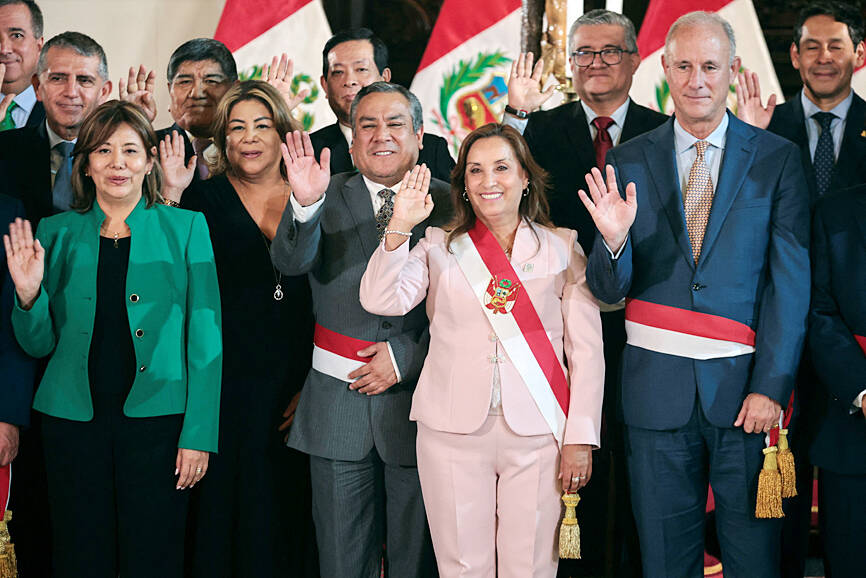Peruvian President Dina Boluarte on Monday replaced six ministers after they resigned as her government is rocked by a political crisis fueled by an alleged illicit enrichment scandal involving luxury watches.
The Cabinet shakeup came as lawmakers submitted to parliament a request to remove her from office for “permanent moral incapacity” three days after police broke down the front door of her residence to search for the watches as part of an investigation.
The request was submitted by lawmakers from various parties, including Peru Libre to which Boluarte once belonged. To remove Boluarte, the move requires 87 votes from the 130-seat unicameral parliament, and so far, five parties that together have 54 votes expressed support for the president following the raid.

Photo: Reuters
Boluarte is being preliminarily investigated for allegedly acquiring an undisclosed collection of luxury watches since becoming vice president and social inclusion minister in July 2021 and then president in December 2022.
Lawmakers in their request to remove her from office cite the investigation against Boluarte as well as countrywide problems, such as rising crime.
She has denied the illicit enrichment accusations.
Late on Friday, armed police officers broke down the front door of Boluarte’s house with a battering ram in search of Rolex watches. The raid marked the first time in Peru’s history that police forcibly entered the home of a sitting president.
The probe began in the middle of last month after a TV show spotlighted Boluarte wearing a Rolex watch worth up to US$14,000 in Peru. Other TV shows later mentioned at least two more Rolexes.
Boluarte, a 61-year-old lawyer, was a modest district official before entering then-Peruvian president Pedro Castillo’s government on a monthly salary of US$8,136 in July 2021. Boluarte later assumed the presidency with a lower salary of US$4,200 per month. Shortly thereafter, she began to display the luxury watches.
She did not list the three watches in an obligatory asset declaration form.
On Monday, Boluarte initially lost three Cabinet members when the ministers of the interior, education and women abruptly resigned.
Victor Torres told reporters his resignation as interior minister was due to a family matter, while the heads of the ministry of women Nancy Tolentino, and of education Miriam Ponce did not offer reasons in the announcements they shared on social media.
Their resignations were followed by the ministers of agriculture, production and foreign trade stepping down.
On announcing his resignation, Torres warned that if Boluarte leaves power “the country will sink.”
Boluarte then swore in six new ministers, including Walter Ortiz, a retired police officer who had previously been director against organized crime, as interior minister. The Cabinet has 18 ministries, in addition to the position of prime minister held by Gustavo Adrianzen.
She also swore in Elizabeth Caldo, a former executive at telecommunications giant Telefonica, as her new foreign trade minister, and Morgan Quero as her education minister.

Polish presidential candidates offered different visions of Poland and its relations with Ukraine in a televised debate ahead of next week’s run-off, which remains on a knife-edge. During a head-to-head debate lasting two hours, centrist Warsaw Mayor Rafal Trzaskowski, from Polish Prime Minister Donald Tusk’s governing pro-European coalition, faced the Eurosceptic historian Karol Nawrocki, backed by the right-wing populist Law and Justice party (PiS). The two candidates, who qualified for the second round after coming in the top two places in the first vote on Sunday last week, clashed over Poland’s relations with Ukraine, EU policy and the track records of their

UNSCHEDULED VISIT: ‘It’s a very bulky new neighbor, but it will soon go away,’ said Johan Helberg of the 135m container ship that run aground near his house A man in Norway awoke early on Thursday to discover a huge container ship had run aground a stone’s throw from his fjord-side house — and he had slept through the commotion. For an as-yet unknown reason, the 135m NCL Salten sailed up onto shore just meters from Johan Helberg’s house in a fjord near Trondheim in central Norway. Helberg only discovered the unexpected visitor when a panicked neighbor who had rung his doorbell repeatedly to no avail gave up and called him on the phone. “The doorbell rang at a time of day when I don’t like to open,” Helberg told television

‘A THREAT’: Guyanese President Irfan Ali called on Venezuela to follow international court rulings over the region, whose border Guyana says was ratified back in 1899 Misael Zapara said he would vote in Venezuela’s first elections yesterday for the territory of Essequibo, despite living more than 100km away from the oil-rich Guyana-administered region. Both countries lay claim to Essequibo, which makes up two-thirds of Guyana’s territory and is home to 125,000 of its 800,000 citizens. Guyana has administered the region for decades. The centuries-old dispute has intensified since ExxonMobil discovered massive offshore oil deposits a decade ago, giving Guyana the largest crude oil reserves per capita in the world. Venezuela would elect a governor, eight National Assembly deputies and regional councilors in a newly created constituency for the 160,000

North Korea has detained another official over last week’s failed launch of a warship, which damaged the naval destroyer, state media reported yesterday. Pyongyang announced “a serious accident” at Wednesday last week’s launch ceremony, which crushed sections of the bottom of the new destroyer. North Korean leader Kim Jong-un called the mishap a “criminal act caused by absolute carelessness.” Ri Hyong-son, vice department director of the Munitions Industry Department of the Party Central Committee, was summoned and detained on Sunday, the Korean Central News Agency (KCNA) reported. He was “greatly responsible for the occurrence of the serious accident,” it said. Ri is the fourth person